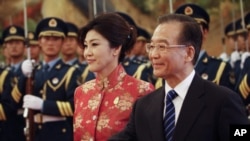Thailand and China want to boost annual bilateral trade to $100 billion by 2015, a goal set during this week's vist to Beijing by Thai Prime Minister Yingluck Shinawatra.
Shinawatra and Chinese Premier Wen Jiabao held talks on boosting cooperation in finance, tourism, agriculture, and transportation. A planned regional high-speed railway network that could link southern China to Laos, Thailand, Malaysia and Singapore was also discussed.
Yingluck's visit consolidates China’s place at the forefront of ties in South East Asia, said Chulalongkorn University political scientist Thitinan Ponsudhirak. The talks also help strengthen ties developed during the term in office of Yingluck’s brother, former leader, Thaksin Shinawatra, who was ousted over corruption allegations in a 2006 coup.
“China has substantial influence in Myanmar [Burma], Laos, Cambodia, and to a smaller extent Vietnam but Thailand is a crucial country," Thitinan said. "It has leaned towards China over the last decade or so especially after the military coup and the polarization in Thailand. But both sides Thaksin and his enemies have leaned on China.”
Several Thai business leaders joined the prime minister on the trip. The Thai Board of Investment announced five companies in the automotive, machinery, food flavoring, and real estate are considering investments worth more than $2 billion in Thailand. Thai businesses, through partnership agreements with Chinese companies, were also looking to invest up to $2.4 billion.
The trip also highlights China's role as a key driver of economic growth in the region, Thitinan said.
“Increasingly China has become the main locomotive for East Asian economic growth so it is not just a symbolic political strategic dimension but also some very substantial trade and investment interest as well.”
Thailand was the first of the 10-member Association of South East Asian Nations (ASEAN) to sign a long term cooperative framework agreement with China over a decade ago.
Carl Thayer, a political analyst at Australia’s University of New South Wales, points out that upgrading to a comprehensive, strategic-cooperative partnership also strengthens their bilateral relations.
"That kind of awarding of a title established a hierarchy and, at least, lets us know China’s views of Thailand," Thayer said. "Therefore, the bottom-line being relatively trouble-free on issues that really count to China.”
Besides the increased economic links, the two agreed to increase joint patrols on the China, Thailand, Lao and Burma borders on the Mekong River.
In October last year 13 Chinese crewmen were killed on the Mekong River, in an attack blamed on drug trafficking gangs. The bloodshed led to a temporary halt in river trade that has largely returned to levels seen prior to the killings.




